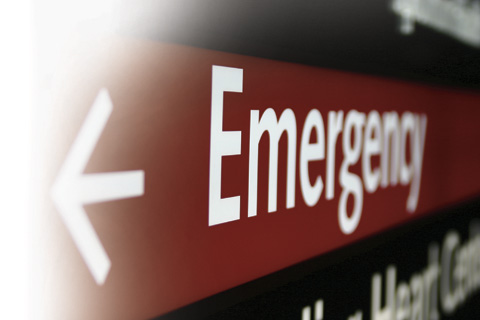ER Visits for Elderly Rise During Thanksgiving
November 15, 2013
 Thanksgiving is a time of eating turkey, gathering with family -- and sometimes taking your elderly loved one to the emergency room.
According to a New York City physician, here's why: When family members who have not seen each other in months gather during the holiday season, they are often alarmed by the health of their older relatives and rush them to the hospital, sometimes unnecessarily, said Dr. Tamara Kuittinen, director of medical education in the Department of Emergency Medicine, at Lenox Hill Hospital.
Kuittinen's observations are not exactly scientific, but over the years she and her colleagues have seen definite increases in the numbers of elderly patients seeking care in emergency departments during this time of year. Her colleague, Dr. Carl Ramsay, associate chairman of Lenox Hill's department of emergency medicine, said he sees a 10 percent to 20 percent increase in the number of elderly emergency department admissions during the holidays.
The cause is probably twofold: relatives often don't keep up with their loved one's health over the course of the year. So, when they get together, they are often shocked by the condition of the elderly family member. Also, Kuittinen added, children of aging parents often are not aware of how the normal aging process takes its toll on people, and they rush their loved one to a health-care provider.
"It's an issue of out of sight, out of mind for many people," she said. "If you haven't seen your mom in six months, you may not be fully aware of the aging process and her health in general."
To help patients and their families strive for better health throughout the year, Kuittinen recently came up with a health maintenance checklist to help relatives keep track of their loved ones.
Maintain a database of up-to-date critical medical information about your loved ones. The list should include their doctors' names, telephone numbers and addresses. In addition, know what medications they are taking, the dosages and any allergies they may have. Older patients often see several specialists and take multiple medications, which pose a real risk of dangerous drug interactions. If possible, get written permission from the relative to speak to his or her doctor if you have questions about treatment.
Make sure your relative has access to a list of emergency contact telephone numbers (including your own) programmed into their phones and posted on their refrigerator or other visible places.
Discuss the possibility of creating a living will or health-care proxy. Health-care proxies help doctors and other providers make decisions in the event the patient is unable to talk. Living wills address such complicated and emotional issues as when to give or withhold lifesaving resuscitation.
A once-a-year discussion about your loved one's health is not enough. Stay in contact with them. Regularly check in to see how they are doing. Make an effort to keep abreast of their conditions, medical tests and medications. Ask them if they are keeping their doctors' appointments.
Finally, for many patients, the emergency department should not be the first place they go. Ramsay cautions family members from taking their elderly relatives to the hospital unless absolutely necessary. All hospitals present a risk of exposure to infections and unnecessary tests, he noted.
First, seek guidance from the patient's own physician if possible, Ramsay said.
"The bottom line is that if someone is worried and they have no other access to medical care, then they should definitely go to the emergency room," Ramsay said.
Source: abcnews.go.com
If you think your senior family member might need some extra assistance, call us for a complimentary care consultation. We are here to help make life easier for you and your loved one.
Santa Clara County- 408-979-9990
Santa Cruz County- 831-480-3990
San Mateo County- 650-353-9777
Thanksgiving is a time of eating turkey, gathering with family -- and sometimes taking your elderly loved one to the emergency room.
According to a New York City physician, here's why: When family members who have not seen each other in months gather during the holiday season, they are often alarmed by the health of their older relatives and rush them to the hospital, sometimes unnecessarily, said Dr. Tamara Kuittinen, director of medical education in the Department of Emergency Medicine, at Lenox Hill Hospital.
Kuittinen's observations are not exactly scientific, but over the years she and her colleagues have seen definite increases in the numbers of elderly patients seeking care in emergency departments during this time of year. Her colleague, Dr. Carl Ramsay, associate chairman of Lenox Hill's department of emergency medicine, said he sees a 10 percent to 20 percent increase in the number of elderly emergency department admissions during the holidays.
The cause is probably twofold: relatives often don't keep up with their loved one's health over the course of the year. So, when they get together, they are often shocked by the condition of the elderly family member. Also, Kuittinen added, children of aging parents often are not aware of how the normal aging process takes its toll on people, and they rush their loved one to a health-care provider.
"It's an issue of out of sight, out of mind for many people," she said. "If you haven't seen your mom in six months, you may not be fully aware of the aging process and her health in general."
To help patients and their families strive for better health throughout the year, Kuittinen recently came up with a health maintenance checklist to help relatives keep track of their loved ones.
Maintain a database of up-to-date critical medical information about your loved ones. The list should include their doctors' names, telephone numbers and addresses. In addition, know what medications they are taking, the dosages and any allergies they may have. Older patients often see several specialists and take multiple medications, which pose a real risk of dangerous drug interactions. If possible, get written permission from the relative to speak to his or her doctor if you have questions about treatment.
Make sure your relative has access to a list of emergency contact telephone numbers (including your own) programmed into their phones and posted on their refrigerator or other visible places.
Discuss the possibility of creating a living will or health-care proxy. Health-care proxies help doctors and other providers make decisions in the event the patient is unable to talk. Living wills address such complicated and emotional issues as when to give or withhold lifesaving resuscitation.
A once-a-year discussion about your loved one's health is not enough. Stay in contact with them. Regularly check in to see how they are doing. Make an effort to keep abreast of their conditions, medical tests and medications. Ask them if they are keeping their doctors' appointments.
Finally, for many patients, the emergency department should not be the first place they go. Ramsay cautions family members from taking their elderly relatives to the hospital unless absolutely necessary. All hospitals present a risk of exposure to infections and unnecessary tests, he noted.
First, seek guidance from the patient's own physician if possible, Ramsay said.
"The bottom line is that if someone is worried and they have no other access to medical care, then they should definitely go to the emergency room," Ramsay said.
Source: abcnews.go.com
If you think your senior family member might need some extra assistance, call us for a complimentary care consultation. We are here to help make life easier for you and your loved one.
Santa Clara County- 408-979-9990
Santa Cruz County- 831-480-3990
San Mateo County- 650-353-9777


